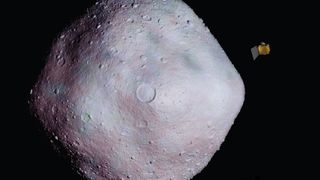
A near-Earth asteroid that will be visited by a NASA spacecraft in 2018 now has a more approachable name — "Bennu" — thanks to a North Carolina third-grader.
Nine-year-old Michael Puzio's suggestion beat out more than 8,000 other entries in an international student contest that sought to rename potentially dangerous asteroid (101955) 1999 RQ36, which is the target of NASA's Osiris-Rex sample-return mission.
"It's great!" Puzio said when told he won the contest. "I'm the first kid I know that named part of the solar system!"[NASA's Osiris-Rex Asteroid Mission in Pictures]
Bennu (pronounced ben-oo) is an Egyptian god usually depicted as a gray heron. Puzio nominated the name because he thought Osiris-Rex's Touch-and-Go Sample Mechanism arm (TAGSAM) and solar panels looked like Bennu's neck and wings, contest officials said.
"The name 'Bennu' struck a chord with many of us right away," Bruce Betts, director of projects for the nonprofit Planetary Society and a judge in the competition, said in a statement. "While there were many great entries, the similarity between the image of the heron and the TAGSAM arm of Osiris-Rex was a clever choice."

The $800 million Osiris-Rex mission — whose name is short for Origins-Spectral Interpretation-Resource Identification-Security-Regolith Explorer — is slated to blast off in September 2016, rendezvous with the 1,840-foot-wide (560 meters) Bennu in 2018 and return pieces of the space rock to Earth in 2023.
Scientists are eager to study such samples for several reasons. Asteroids are composed of primitive material left over from the formation of the solar system more than 4.5 billion years ago, for example, and they may have helped life gain a foothold on Earth by delivering water and complex, carbon-rich molecules to our planet.
Get the Space.com Newsletter
Breaking space news, the latest updates on rocket launches, skywatching events and more!
"The samples of Bennu returned by Osiris-Rex will allow scientists to peer into the origin of the solar system and gain insights into the origin of life,” Jason Dworkin, an Osiris-Rex project scientist at NASA's Goddard Space Flight Center in Greenbelt, Md., said in a statement.
Bennu is also a potentially hazardous asteroid that has a roughly 1-in-1,000 chance of hitting Earth in 2182, so a detailed study of the space rock could come in handy if humanity ever needs to deflect it or similar space rocks, researchers say.
The "Name that Asteroid!" competition launched last year. It was a partnership involving the University of Arizona, where Osiris-Rex principal investigator Dante Lauretta works; The Planetary Society; and the Lincoln Near Earth Asteroid Research (LINEAR) survey at the Massachusetts Institute of Technology's Lincoln Laboratory.
Contestants, who had to be younger than 18, submitted a name along with a short explanation for their choice. More than 8,000 students from more than 25 countries around the world participated, contest officials said.
"Bennu" will be submitted to the International Astronomical Union, which traditionally has approved "official" astronomical names for celestial bodies, they added.
Follow Mike Wall on Twitter @michaeldwall and Google+. Follow us @Spacedotcom, Facebookor Google+. Originally published on SPACE.com.
Join our Space Forums to keep talking space on the latest missions, night sky and more! And if you have a news tip, correction or comment, let us know at: community@space.com.

Michael Wall is a Senior Space Writer with Space.com and joined the team in 2010. He primarily covers exoplanets, spaceflight and military space, but has been known to dabble in the space art beat. His book about the search for alien life, "Out There," was published on Nov. 13, 2018. Before becoming a science writer, Michael worked as a herpetologist and wildlife biologist. He has a Ph.D. in evolutionary biology from the University of Sydney, Australia, a bachelor's degree from the University of Arizona, and a graduate certificate in science writing from the University of California, Santa Cruz. To find out what his latest project is, you can follow Michael on Twitter.
